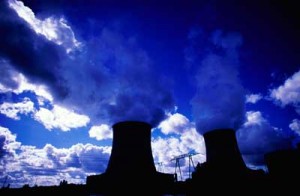Radiation in the Atmosphere
Radiation is already present in our atmosphere. Currently our atmosphere contains radiation from the sun and from past nuclear fallout. The atmosphere works as a filter to remove radiation and it also produces a natural greenhouse effect to maintain the temperatures needed for organisms to survive. UV rays are absorbed by the ozone layer and infrared rays are taken in by H2O and CO2. The absorption of different radiation energy causes chemical reactions to take place.
Most radiation in the atmosphere is produced by people, which can have a broad effect on the environment. For example, it can significantly alter the chemical composition of the atmosphere. An explosion of nuclear proportions can send particles hundreds of miles into the air and the only way to avoid the effects is through great distance.
The effects of neutron radiation are stronger near the blast site but gamma radiation can spread out much further. The intensity of the radiation can cause anywhere from critical cell death to burning or delayed effects, which are not apparent until later in the life of the organism.
Clean up of radiation can be near impossible. Radiation is so penetrating and pervasive once it occurs that only natural radioactive decay can eliminate it. Residual radiation is dangerous and can affect environments for indefinite amounts of time. The only solutions are prevention, evacuation of the affected area and treatment of damage caused by the radiation.
Even if radioactive decay occurs it can take hundreds, even thousands of years to fully decay. It depends on the type of radiation. Further testing of a nuclear site will determine the rate of the decay and how long it will take before an area is safe for humans and animals. However, many areas such as Chernobyl are still unpopulated and lack biodiversity because of the damaged caused by previous radiation. People are afraid to return to these previously contaminated areas, out of a fear that residual radioactivity will harm them.
Another way to reduce radiation is for it to be dispersed. The dispersing of radioactive material is dependent upon atmospheric conditions and wind patterns. Snow and rain have the potential to make fallout worse, as they bring contaminants to the ground. In the most hopeful situation radiation would stay in the atmosphere long enough to begin deteriorating. Rain and snow can create zones of concentrated radiation that is unlikely to dissipate.
http://history.nasa.gov/conghand/nuclear.htm
https://www.fas.org/nuke/intro/nuke/radiation.htm

